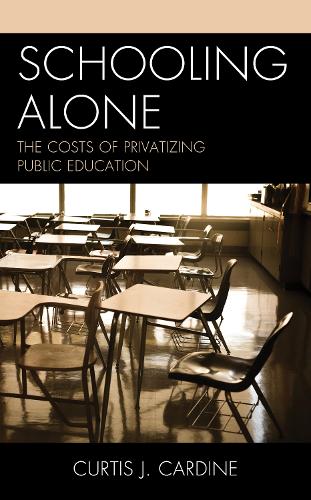
Schooling Alone: The Costs of Privatizing Public Education
(Paperback)
Publishing Details
Schooling Alone: The Costs of Privatizing Public Education
By (Author) Curtis J. Cardine
Bloomsbury Publishing PLC
Rowman & Littlefield Publishers
3rd October 2019
United States
Classifications
Professional and Scholarly
Non Fiction
Educational strategies and policy
Educational administration and organization
371.050973
Physical Properties
Paperback
210
Width 152mm, Height 221mm, Spine 13mm
331g
Description
Schooling Alone is a look at the history of public education and the current state of the efforts to privatize our public schools. This work looks at who is really choosing and what we, as members of a democratic republic, are losing as privatization of our publicly funded institutions moves forward. There is a difference between a capitalist economic theory and the values of a democratic republic. This work asks the reader to consider what our values regarding public education should be.
Reviews
Cardine, an educator and research practitioner, builds on ideas of public education chartering developed by the late Ray Budde of the University of Massachusetts, Amherst, to critique the financial models that support the development of US charter schools. The title and focus is analogous to Robert D. Putnams Bowling Alone (CH, Dec'00, 38-2454), representing a decline in societal cohesion. Accordingly, Cardine views the rise of over 7,000 publicly supported charter schools with over 3,000,000 students as a phenomenon primarily serving school districts that already excel, causing a loss in the common political and social capital formed by community public schools. Cardine describes how charter schools treat teachers as contractors with salary and benefits below the level of neighboring schools, are a tool for deprofessionalizing public education, and fit into the current political movement for deregulation of public goods and services. Charter schools are thus often profit-oriented businesses, with 10 charter groups controlling three-quarters of enrollments, and only 23 percent have local governing boards. As the author concludes, charter providers should run their charters as a vital part of their communities educational choices in a democratic republic in partnership with our publicly governed public schools. Summing Up: Highly recommended. Graduate students, faculty, and professionals. * Choice Reviews *
In Schooling Alone, Cardines passion for the public good is palpable. He lays bear the tensions between the penchant for free markets and the universal commitment to public education via a detailed examination that demonstrates where the once well-meaning idea of school choice has gone awry. He takes on some of the most challenging issues in education policy, such as the societal implications of parents freedom to choose and the adverse economic implications of charter school operators running schools like businesses. Its a warning about whats at stake in the unfettered expansion of school choice policies. -- David R. Garcia, PhD, Associate Professor, Mary Lou Fulton Teachers College, Arizona State University
Curt Cardine believes in quality education and the original idea of charter schools led by innovative teaching professionals. In Schooling Alone he unveils how charter schools have become a for profit industry where corporations make money off children and both government and the market fail to provide sufficient oversight. While we have some wonderful charter schools as initially intended, Cardine shows how the system is failing to remove the bad actors. -- Dave Wells, PhD, Research Director, Grand Canyon Institute
Author Bio
Curtis J. Cardine has served as a teacher, principal, corporate officer, and superintendent in New Hampshire public schools and Arizona charter schools. He is currently a research fellow for the Grand Canyon Institute, author and a nationally recognized expert on charter and public school finances and governance.
